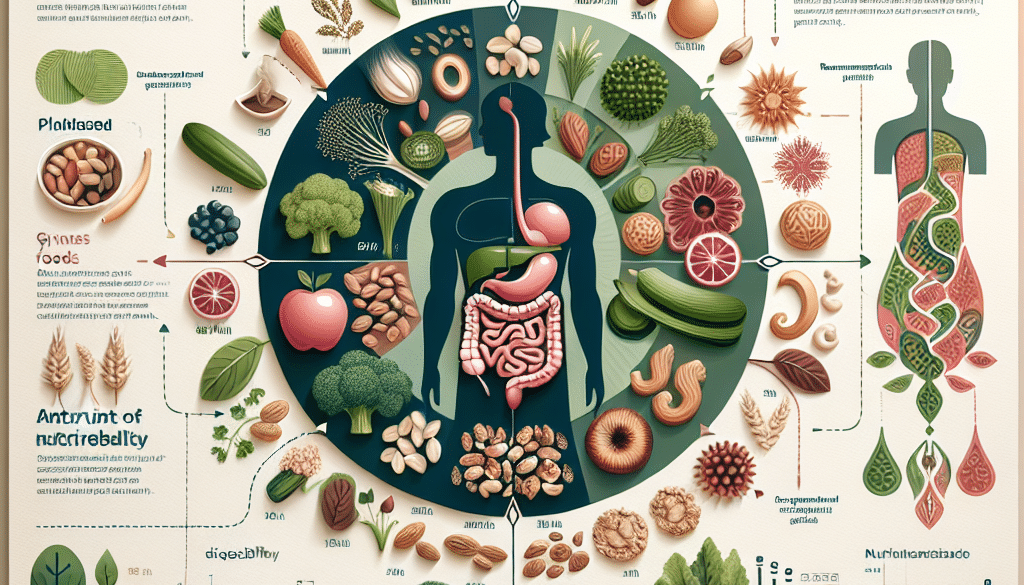Plant-based Nutrition: Managing Intake and Bioavailability
-
Table of Contents
- Plant-Based Nutrition: Optimizing Intake and Bioavailability
- Understanding Plant-Based Diets
- The Importance of Nutrient Bioavailability
- Key Nutrients in Plant-Based Diets
- Protein: Combining and Complementing
- Iron: Enhancing Absorption
- Calcium: Plant-Based Sources
- Vitamin B12: Supplementation May Be Necessary
- Omega-3 Fatty Acids: Plant-Based Options
- Zinc: Absorption Considerations
- Case Studies and Statistics
- Conclusion: Balancing Plant-Based Nutrition
- ETChem’s Protein Products: Enhancing Plant-Based Diets
Plant-Based Nutrition: Optimizing Intake and Bioavailability

As the popularity of plant-based diets continues to rise, understanding the management of nutrient intake and bioavailability becomes increasingly important. Plant-based nutrition offers a plethora of health benefits, but it also requires careful planning to ensure that all nutritional needs are met. This article delves into the strategies for optimizing the intake and bioavailability of nutrients from plant sources.
Understanding Plant-Based Diets
Plant-based diets are composed predominantly of foods derived from plants, including vegetables, fruits, grains, nuts, seeds, and legumes. While some individuals choose to exclude all animal products, adopting a vegan lifestyle, others may include small amounts of animal-derived foods in their diet.
The Importance of Nutrient Bioavailability
Nutrient bioavailability refers to the proportion of a nutrient that is absorbed from the diet and used for normal body functions. The bioavailability of certain nutrients can be lower in plant-based diets due to the presence of natural compounds that inhibit absorption. Understanding and managing these factors is crucial for maintaining optimal health on a plant-based diet.
Key Nutrients in Plant-Based Diets
Several nutrients require special attention in plant-based diets to ensure adequate intake and bioavailability:
- Protein
- Iron
- Calcium
- Vitamin B12
- Omega-3 fatty acids
- Zinc
Protein: Combining and Complementing
Protein is a macronutrient essential for building and repairing tissues, among other functions. Plant-based sources of protein include legumes, nuts, seeds, and whole grains. To ensure a complete amino acid profile, it’s important to combine different plant proteins. For example, rice and beans eaten together provide all the essential amino acids the body needs.
Iron: Enhancing Absorption
Iron is vital for the production of hemoglobin and overall energy levels. Plant-based sources of iron include lentils, chickpeas, and spinach. However, plant-based iron (non-heme iron) is less bioavailable than the heme iron found in animal products. To enhance absorption, consume vitamin C-rich foods like oranges or bell peppers alongside iron-rich plant foods.
Calcium: Plant-Based Sources
Calcium is crucial for bone health and metabolic functions. While dairy products are a well-known source of calcium, plant-based options include fortified plant milks, tofu, and leafy greens. It’s important to choose foods with added calcium and to be mindful of compounds like oxalates in spinach that can inhibit calcium absorption.
Vitamin B12: Supplementation May Be Necessary
Vitamin B12 is essential for nerve function and the production of DNA and red blood cells. It is naturally found in significant amounts only in animal products, so those on a strict plant-based diet may need to rely on fortified foods or supplements to meet their B12 needs.
Omega-3 Fatty Acids: Plant-Based Options
Omega-3 fatty acids are important for heart and brain health. Flaxseeds, chia seeds, and walnuts are excellent plant-based sources of alpha-linolenic acid (ALA), a type of omega-3 fatty acid. However, the conversion of ALA to the more active forms EPA and DHA is limited, so some individuals may consider algae-based supplements.
Zinc: Absorption Considerations
Zinc plays a role in immune function and wound healing. Plant-based sources include legumes, nuts, and seeds. Phytates found in whole grains and legumes can bind to zinc and inhibit its absorption, so methods like soaking, sprouting, or fermenting can help increase zinc bioavailability.
Case Studies and Statistics
Research has shown that well-planned plant-based diets can support health and are associated with lower risks of heart disease, hypertension, type 2 diabetes, and certain cancers. For instance, a study published in the Journal of the American Heart Association found that a plant-based diet was associated with a 16% lower risk of cardiovascular disease.
Conclusion: Balancing Plant-Based Nutrition
Adopting a plant-based diet can offer numerous health benefits, but it requires careful planning to ensure that all nutritional needs are met. By understanding the factors that affect nutrient bioavailability and implementing strategies to enhance absorption, individuals can thrive on a plant-based diet.
ETChem’s Protein Products: Enhancing Plant-Based Diets
For those looking to supplement their plant-based diet, ETChem offers a range of high-quality protein products. Their portfolio includes various types of collagen, which can be a valuable addition to a plant-based diet, especially for individuals concerned about protein intake and joint health. ETChem’s products are characterized by their neutral taste and instant solubility, making them an excellent choice for anyone looking to boost their protein consumption through supplements.
About ETChem:
ETChem, a reputable Chinese Collagen factory manufacturer and supplier, is renowned for producing, stocking, exporting, and delivering the highest quality collagens. They include marine collagen, fish collagen, bovine collagen, chicken collagen, type I collagen, type II collagen and type III collagen etc. Their offerings, characterized by a neutral taste, instant solubility attributes, cater to a diverse range of industries. They serve nutraceutical, pharmaceutical, cosmeceutical, veterinary, as well as food and beverage finished product distributors, traders, and manufacturers across Europe, USA, Canada, Australia, Thailand, Japan, Korea, Brazil, and Chile, among others.
ETChem specialization includes exporting and delivering tailor-made collagen powder and finished collagen nutritional supplements. Their extensive product range covers sectors like Food and Beverage, Sports Nutrition, Weight Management, Dietary Supplements, Health and Wellness Products, ensuring comprehensive solutions to meet all your protein needs.
As a trusted company by leading global food and beverage brands and Fortune 500 companies, ETChem reinforces China’s reputation in the global arena. For more information or to sample their products, please contact them and email karen(at)et-chem.com today.




